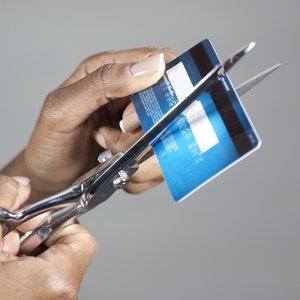
Closing a credit card account won’t bring you many advantages while you pay off your balance, but it can help you manage your credit better. You’ll still need to meet all of your obligations while you pay off a closed card, but you won’t increase your balance, keeping your minimum payments lower than if you continued charging. If you have multiple credit cards, talking with each company before you cancel will help you make the right decision regarding which card to cancel.
Tips
You can close a credit card and slowly pay off the balance but be mindful of how this will possibly impact your credit score.
Closing Credit Card Accounts
The two primary benefits of closing a credit card account are having one less credit card on your credit report and capping your balance, as you won’t be charging anymore. Depending on how many credit cards you have, closing a card can improve your credit score. When you close an account, you lose your ability to use the card and reduce the risk of credit card fraud with that account. You still must meet all of your obligations with that card, including paying your minimum monthly payments on time and any interest rate changes you agreed to when you opened the account. Some card companies might raise your minimum monthly payment if you close an account, and it’s important to confirm the terms with each card company before you close an account to keep your payments as low as possible.
Paying Balances Slowly
The less money you pay on your account, the more interest you pay because you pay interest longer. You probably will not be able to pay less than your required minimum balance after you close an account; contact your card company to discuss your options. The Credit Card Accountability, Responsibility and Disclosure Act of 2009 requires credit card companies to show you how long it will take to pay off your card making only the minimum payment each month and the amount of interest you’ll pay by the time you finish clearing your balance, and you can find this on your monthly statement. The act also requires the credit card company to show you the three-year payoff schedule.
Balance Transfers
One way to reduce your interest payments while you pay off a balance slowly is to try to transfer all or part of a card balance to a new card with a low-interest or interest-free balance transfer promotion. For example, if you have a $10,000 balance on one of your cards, you might be able to transfer $5,000 of that to a new card that doesn’t charge you interest for six to 18 months or offers you a low rate during that period that is better than the rate on the card you want to cancel. You can make the minimum payment on the low-interest or interest-free balance while making larger payments on the old card. Keep in mind that after the promotional period ends, your interest rate on the new card will increase.
Credit Reports
Before you close or open any credit card accounts, get copies of your credit report to make sure all of your information is correct. Negative information on your credit report can damage your creditworthiness enough to deny you the ability to get new credit cards or low-interest rates. You can get free copies of your reports each year at AnnualCreditReport.com. Once you know your credit report is accurate, start contacting your current card companies to discuss your options or begin shopping for new cards.
References
- U.S. Government Printing Office: Credit Card Accountability, Responsibility and Disclosure Act of 2009
- Bankrate.com: 6 Ways to Pay Off Credit Card Debt
- AnnualCreditReport.com: Frequently Asked Questions
- MyFICO: What Is a Fico Score?
- Debt.org. "Revolving Credit: What It Is & How It Works." Accessed May 17, 2020.
- Federal Trade Commission. "Using a Credit Card." Accessed May 17, 2020.
- Experian. "What Are the Different Types of Credit Cards?" Accessed May 17, 2020.
- Experian. "What is a Good Credit Score?" Accessed May 17, 2020.
- Consumer Financial Protection Bureau. "How to Find the Best Credit Card." Accessed May 17, 2020.
- Experian. "What is a Cash Advance?" Accessed May 17, 2020.
- USA.gov. "Credit Cards." Accessed May 17, 2020.
- Experian. "How to Avoid Foreign Transaction Fees." May 17, 2020.
- Experian. "Balance Transfer Credit Cards." Accessed May 17, 2020.
- Experian. "What Is APR and How Does It Affect Me?" Accessed May 17, 2020.
- Experian. "What Is a Rewards Credit Card?" Accessed May 17, 2020.
- Experian. "Going Over the Limit on Your Credit Card." Accessed May 17, 2020.
- Experian. "Will Closing a Credit Card Hurt Your Credit?" Accessed May 17, 2020.
- Federal Trade Commission. "Protecting Against Credit Card Fraud." Accessed May 17, 2020.
Writer Bio
Sam Ashe-Edmunds has been writing and lecturing for decades. He has worked in the corporate and nonprofit arenas as a C-Suite executive, serving on several nonprofit boards. He is an internationally traveled sport science writer and lecturer. He has been published in print publications such as Entrepreneur, Tennis, SI for Kids, Chicago Tribune, Sacramento Bee, and on websites such Smart-Healthy-Living.net, SmartyCents and Youthletic. Edmunds has a bachelor's degree in journalism.

